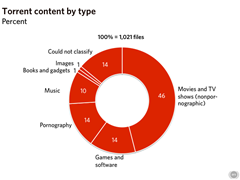 Though the size of the sample makes it a bit closer to anecdotal than scientific, a study has looked at a random sample of about 1,000 files shared via BitTorrent and found only 1% of them do not infringe copyright.
Though the size of the sample makes it a bit closer to anecdotal than scientific, a study has looked at a random sample of about 1,000 files shared via BitTorrent and found only 1% of them do not infringe copyright.
Ars Technica makes the point that only 10% of these files are music, which used to be the reason to get onto peer-to-peer. Now, thanks to the departure of music DRM, there is little reason to go to peer-to-peer since unrestricted music can be bought cheaply from trusted sources—even though the lack of DRM means that purchased mp3s can be shared as easily as CD rips.
Aside from 14% of the files which the researcher could not classify, 46% were television shows and movies, 14% pornography, 14% games and software, 1% images, and only 1% books and gadgets. (So much for the fears of rampant e-book piracy.)
Only 1% of these files—7 from games and software and 1 of the pornography titles which the researcher gave the benefit of the doubt—were found to be non-infringing.
Ars points to this xkcd cartoon, saying:
Movies and TV shows, on the other hand, are hugely popular on Bit Torrent—a trend that seems to mysteriously coincide with the heavy DRM and restrictions that come with that kind of content. DVD encryption, browser restrictions, DRM on downloads from iTunes or Amazon—there’s effectively no way for consumers to buy this content without restrictions, so they’re turning to P2P to get it.
I would be inclined to add that some are probably downloading TV shows because they can’t afford TiVos or don’t get the cable channels on which those shows air. DRM doesn’t enter into it—they just want to see the show as soon as they can, and probably wouldn’t buy it anyway (especially if they could just watch it on Hulu instead).
Either way, books make up a remarkably small percentage of these figures, for all that publishers are sounding alarms about e-books being available on the Internet now that people actually want them.
Of course, this is only one sample of 1,000 out of the millions of files in circulation. It is possible that other samples might produce widely variant results.
(Moved to top of blog. Posted earlier. – D.R.)

































No surprise here. Book piracy is really really minor. The DRM effectively protects the ebooks as most pirated books are pdf scans or audio books.
So don’t buy the publishers jive about piracy. NOT a factor.
Blaming DRM is just a standard “blame the victim” tactic.
Ebooks with DRM are pirated, ebooks with no DRM are pirated, ebooks with low and high prices are pirated, and digital copies of paper books are pirated. The only true variable is how much people want the specific books.
Anyone who looks at the number of downloads at the pirate sites can see this, and many, many authors of my acquaintance certainly see this.
Publishing has a very low margin of profit, and authors an even lower one, if they see a profit at all.
One percent seems small unless you are part of that percent.
I’ll back up your statement “downloading TV shows because they can’t afford TiVos or don’t get the cable channels on which those shows air”. Right now, I live in Japan, so I can’t watch the few tv shows from the US that I like. Obviously, that leaves downloading as my only choice. Even if I was in the US, I’d still download because I don’t have a DVR or media center, and likely wouldn’t even have a TV. (Why have one just to watch a handful of shows?) From any angle, it’s much more convenient to download a show when I want to watch it.
The iTunes store’s main benefit was that it gave the average person a convenient way to buy from a large collection of music (all major labels), that was guaranteed to play on your computer. Once that is in place, competition will focus on price and openness.
So I’d agree with Marilynn that DRM is a second order concern when it comes to e-book piracy – it only hurts the legitimate buyer.
In my view, availability is the major issue, because of territorial rights and format confusion (esp. DRM).
E.g., if I’m in Turkey, where would I be able to find a large collection of e-books (say, 90% of sales-weighted titles) in format Y (which is the only DRM format that my e-reader accepts)?